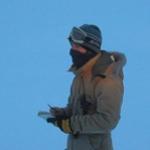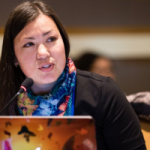ARC-NAV: Arctic Robust Communities-Navigating Adaptation to Variability
The Arctic is warming on average twice as rapidly as the rest of the planet, which is leading to significant changes in sea ice to which local communities must respond. Beringia, a region of the Arctic encompassing US and Russian territory, is expected to experience some of the highest variability in sea ice conditions in the coming century. This project focuses on the question: how do we design better and more flexible governance and infrastructure to adapt to changing Arctic conditions? To answer this question, the team is taking a convergence approach to forecast potential changes in the Arctic sea ice environment and the impacts on social and ecological systems resulting from those changes and identify adaptive strategies to enhance resilience to those impacts. The project fully engages local and Indigenous communities and decision makers in the Arctic throughout the research process to generate information and models about critical hot spots of sea ice change relevant to local communities. This will help build local and regional governance capacity and allow the researchers to model and predict the robustness of communities to forecast changes.
Coproduction of knowledge between local and Indigenous communities and scientists, and collaborative research across disciplinary and national boundaries, will be used to address four key research questions: 1) How do people understand and perceive changing sea ice, and how do they adapt to variability in ice conditions? 2) Where are the current critical hot spots of variability in sea ice, and where will they be in the future as the environment and communities change? 3) How will governmental and non-governmental organizations in the region navigate changing sea ice conditions and interact with communities to respond to their changing needs? and 4) What features of the existing, and potential, social-ecological systems are robust/fragile to forecast changes in sea ice? This project will document diverse narratives and critical policy challenges around biogeophysical changes and associated livelihood and economic opportunities/costs between and within communities through grounded ethnography and cultural consensus analysis. Satellite data will be used to highlight "hot spots" of sea ice variability and provide a starting point for community and stakeholders' discussions of "change". Interviews with governance actors will identify priorities and responses and generate spatially explicit policy networks. A multi-agent model will link these analyses and be utilized to explore the diversity of issues, projections of change, and fragility or robustness of communities and the infrastructure systems they rely on. Through this research, the project will derive new understandings of community and institutional responses to change, the impacts of spatial and temporal variability within a trend, and robustness-fragility trade-offs that can be applied to other regions as they navigate transitions around the globe in the Anthropocene.
This collaborative project between York (1928235, LEAD, ASU), Degai (1928202, UNI), Mahoney (1928259, UAF) and Tremblay (1928126, Columbia) is part of the NNA (Navigating the New Arctic) and will work with local communities in Alaska and Russia conducting interviews and ice observations from 2020 to 2023, with meetings with community members scheduled in 2019. In the late fall of 2019, one researcher will visit the Alaskan villages of Gambell and Point Hope, and in spring 2020 two researchers went to Point Hope to begin establishing community relationships and lay groundwork for field work during subsequent years. In 2020-21, field work has been canceled due to the pandemic, with spring ice observations canceled. Researchers plan to conduct fieldwork in late summer/fall. In 2023 a research team will make a seven-day early spring ice observation as well as interview trips to Gambell and Point Hope in Alaska. Fieldwork in Russia has been delayed until the geopolitical situation changes. Both Russian community relationship building and fieldwork will occur in the future, if possible. Early spring ice observations trips will be followed by summer trips to all four communities in 2020 and 2021, as well as summer trips during 2022 and 2023. During each summer trip, researchers will visit each community for community engagement meetings and cross-site learning. Summer trips will be from seven to 35 days in duration.
Season Field Site
2019 Alaska - Gambell
2019 Alaska - Kotzebue (canceled)
2019 Alaska - Nome (canceled)
2019 Alaska - Point Hope
2019 Russia - Petropavlovsk
2020 Alaska - Gambell (canceled)
2020 Alaska - Point Hope
2020 Russia - Pakhachi (canceled)
2020 Russia - Sireniki (canceled)
2021 Alaska - Gambell (canceled)
2021 Alaska - Point Hope (canceled)
2021 Russia - Pakhachi (canceled)
2021 Russia - Sireniki (canceled)
2022 Alaska - Gambell
2022 Alaska - Point Hope
2022 Alaska - Kotzebue
2022 Alaska - Nome
2022 Russia - Pakhachi (canceled)
2022 Russia - Sireniki (canceled)
2023 Alaska - Gambell
2023 Alaska - Point Hope
2023 Russia - Pakhachi (on hold)
2023 Russia - Sireniki (on hold)
Co-Principal Investigators
Publications
Blockley, E., M. Vancoppenolle, E. Hunke, C. Bitz, D. Feltham, J..-F. Lemieux, M. Losch, E. Maisonnave, D. Notz, P. Rampal, S. Tietsche, B. Tremblay, A. Turner, F. Massonnet, E. Ólason, A. Roberts, Y. Aksenov, T. Fichefet, G. Garric, D. Iovino, G. Madec, C. Rousset, D. Salas y Melia, and D. Schroeder, 2020: The Future of Sea Ice Modeling: Where Do We Go from Here?, Bulletin of the American Meteorological Society, 101(8), https://doi.org/10.1175/BAMS-D-20-0073.1
York, A.M., C.D. Otten, S. BurnSilver, S.L. Neuberg, and J.M. Anderies, 2021: Integrating institutional approaches and decision science to address climate change: a multi-level collective action research agenda, Current Opinion in Environmental Sustainability, 52:19-26, https://doi.org/10.1016/j.cosust.2021.06.001
York, A.M., E. Zdor, S. BurnSilver, T. Degai, M. Monakhova, S. Isakova, A.N. Petrov, M. Kempf, 2022: Institutional navigation of oceans governance: Lessons from Russia and the United States Indigenous multi-level whaling governance in the Arctic, Earth System Governance, 14, https://doi.org/10.1016/j.esg.2022.100154








